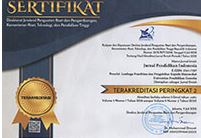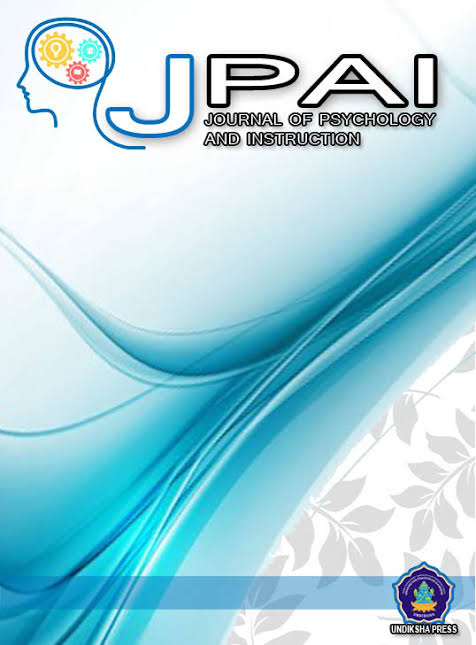Mobile-Based Elementary School Report Card Information System (SIRAM) to Reduce Teacher Stress Levels
DOI:
https://doi.org/10.23887/jpai.v6i1.50239Keywords:
Mobile Rapor, SIRAM, Stress GuruAbstract
The conventional report cards that are used still have a high level of complexity, thus triggering the teacher's stress level at the end of each semester in inputting grades. The purpose of this study was to create a mobile-based elementary school report card information system (SIRAM) to reduce teacher stress levels. This development research uses the ADDIE model. In this study using a quantitative approach as well as qualitative. The research subjects were grade 3 (three) teachers. Methods of data collection using interviews, observation guidelines, questionnaires, and rating scale sheets. The data analysis technique used the one sample t-test. Based on the analysis carried out, the results of the SIRAM application have Login, Create, Read, Update, Delete (CRUD) features. The result of content validity is 0.9, so that it is declared valid with a high level of validity indicating that it is feasible to use it. The results of the effectiveness test of the teacher's stress level, with a significance level of 0.05 (5%) obtained a t value of 1.761, then the SIRAM application did not affect the teacher's stress level, before and after the administration of the SIRAM application. The implication of this research is that it is hoped that the next impact will be that schools can subscribe to hosting as a support for applications so that they can continue to use the SIRAM application in the future.
References
Abdullah, B., Radiansyah, R., & Akbar, A. (2015). Pendidikan Karakter Di Madrasah Aliyah Negeri (Man) 2 Banjarmasin. Inferensi, 9(2), 537. https://doi.org/10.18326/infsl3.v9i2.537-560. DOI: https://doi.org/10.18326/infsl3.v9i2.537-560
Aini, E. N., ’Adna, S. F., & Najibufahmi, M. (2021). Pengembangan Mobile Learning Berbasis Android Dengan Metode Kumon Untuk Materi Integral Tak Tentu. Delta: Jurnal Ilmiah Pendidikan Matematika, 9(2), 271. https://doi.org/10.31941/delta.v9i2.1415. DOI: https://doi.org/10.31941/delta.v9i2.1415
Anggraini, W., & Kuswanto, C. W. (2019). Teknik Ceklist Sebagai Asesmen Perkembangan Sosial Emosional di RA. Al-Athfaal: Jurnal Ilmiah Pendidikan Anak Usia Dini, 2(2), 61–70. https://doi.org/10.24042/ajipaud.v2i2.5248. DOI: https://doi.org/10.24042/ajipaud.v2i2.5248
Azhar Juliantri, L., Sumaryanto Florentinus, T., Wibawanto, H., & Artikel, S. (2017). Pengembangan E-Rapor Kurikulum 2013 Berbasis Web di SMK Negeri 1 Slawi. Innovative Journal of Curriculum and Educational Technology IJCET, 6(1), 11–16. https://journal.unnes.ac.id/sju/index.php/ujet/article/view/15571.
Cahyadi, R. A. H. (2019). Pengembangan Bahan Ajar Berbasis Addie Model. Halaqa: Islamic Education Journal, 3(1), 35–42. https://doi.org/10.21070/halaqa.v3i1.2124. DOI: https://doi.org/10.21070/halaqa.v3i1.2124
Fahsya, M. A., Rusmayani, & Khoeron. (2020). Korelasi Penggunaan Aplikasi Raport Digital Terhadap Kinerja Guru SD Negeri di Kelurahan Tuban Tahun Pelajaran 2019/2020. Jurnal Mahasiswa STAI Denpasar Bali Program Studi Manajemen Pendidikan Islam Dan Pendidikan Agama Islam, 1(1), 1–12. https://www.journal.staidenpasar.ac.id/index.php/ft/article/view/91.
Fatihahsari, F., & Darujati, C. (2021). Analisis Usability Mobile Apps Edlink dengan Menggunakan Heuristic Evaluation. Sistemasi: Jurnal Sistem Informasi, 10(2), 404–413. https://doi.org/10.32520/stmsi.v10i2.1263. DOI: https://doi.org/10.32520/stmsi.v10i2.1263
Febriyanto, E., Naufal, R. S., & Sulistiawati, S. (2020). Planning of the Web-based E-Raport Assessment System. Aptisi Transactions On Technopreneurship (ATT), 2(1), 48–58. https://doi.org/10.34306/att.v2i1.27. DOI: https://doi.org/10.34306/att.v2i1.27
Hardjono, B., Widjaja, A. E., Rhizma, M. G. A., Tjahyadi, H., Haryani, C. A., & Renatan, W. (2020). Komunikasi Nirkabel Dengan Aplikasinya Di Bidang Telekomunikasi Dan Informatika (1st ed.). CV Andi Offset.
Imania, K. A. N., & Bariah, S. K. (2019). Rancangan Pengembangan Instrumen Penilaian Pembelajaran Berbasis Daring. Jurnal Petik, 5(1), 31–47. https://doi.org/10.31980/jpetik.v5i1.445. DOI: https://doi.org/10.31980/jpetik.v5i1.445
Ismail, N. S., Harun, J., Zakaria, M. A. Z. M., & Salleh, S. M. (2018). The effect of Mobile problem-based learning application DicScience PBL on students’ critical thinking. Thinking Skills and Creativity, 28, 177–195. https://doi.org/10.1016/j.tsc.2018.04.002. DOI: https://doi.org/10.1016/j.tsc.2018.04.002
Lazwardi, D. (2017). Implementasi Evaluasi Program Pendidikan Di Tingkat Sekolah Dasar Dan Menengah. Kependidikan Islam, 7(2), 67–79. https://doi.org/https://doi.org/10.24042/alidarah.v7i2.2267.
Meyer-Beining, J., Vigmo, S., & Mäkitalo, Å. (2018). The Swedish grade conference: A dialogical study of face-to-face delivery of summative assessment in higher education. Learning, Culture and Social Interaction, 19(May), 134–145. https://doi.org/10.1016/j.lcsi.2018.05.004. DOI: https://doi.org/10.1016/j.lcsi.2018.05.004
Msosa, A., Bruce, J., & Crouch, R. (2021). Effect of a formative assessment intervention on nursing skills laboratory learning in a resource-constrained country. Nurse Education Today, 97(October 2019), 104677. https://doi.org/10.1016/j.nedt.2020.104677. DOI: https://doi.org/10.1016/j.nedt.2020.104677
Munthe, A. P. (2015). Pentingnya Evaluasi Program Di Institusi Pendidikan: Sebuah Pengantar, Pengertian, Tujuan dan Manfaat. Scholaria : Jurnal Pendidikan Dan Kebudayaan, 5(2), 1. https://doi.org/10.24246/j.scholaria.2015.v5.i2.p1-14. DOI: https://doi.org/10.24246/j.scholaria.2015.v5.i2.p1-14
Muruganantham, G. (2015). Developing of E-Content Package by Using ADDIE Model. International Journal of Applied Research, 1(3), 52–54. https://www.researchgate.net/profile/Muruganantham-Ganesan/publication/339102976_Developing_of_E-content_pcakge_by_using_ADDIE_Model/links/5e3d6c4392851c7f7f249dc8/Developing-of-E-content-pcakge-by-using-ADDIE-Model.pdf.
Nurdin, M. A., & Musthofa, A. H. (2020). Aplikasi Rapor Digital Madrasah Dalam Penilaian Hasil Belajar Siswa. EL Bidayah: Journal of Islamic Elementary Education, 2(1), 67–78. https://doi.org/10.33367/jiee.v2i1.1041. DOI: https://doi.org/10.33367/jiee.v2i1.1041
Nurgiyantoro, B., Gunawan, & Marzuki. (2015). Statistik Terapan Untuk Penelitian Ilmu Sosial (6th ed.). Gajah Mada University Press.
Nuryadi, Astuti, T. D., Utami, E. S., & Budiantara, M. (2017). Dasar-Dasar Statistika Penelitian. Sibuku Media.
Pangastuti, A. D., & Priantinah, D. (2019). Penerapan Sistem Informasi Raport Online. Ekuitas: Jurnal Pendidikan Ekonomi, 7(1), 1–4. https://doi.org/10.23887/ekuitas.v7i1.16488. DOI: https://doi.org/10.23887/ekuitas.v7i1.16488
Pratama, M. A. (2021). Macam-Macam Sistem Operasi Komputer (OS). Resume Upload OSF. https://doi.org/10.31219/osf.io/e7jxc. DOI: https://doi.org/10.31219/osf.io/e7jxc
Puspaningrum, A. S., Neneng, N., Saputri, I., & Ariany, F. (2020). Pengembangan E-Raport Kurikulum 2013 Berbasis Web Pada SMA Tunas Mekar Indonesia. Jurnal Komputasi, 8(2), 94–101. https://doi.org/10.23960%2Fkomputasi.v8i2.2692. DOI: https://doi.org/10.23960/komputasi.v8i2.2692
Salem, M. A., & Samad, Y. A. (2021). Implementasi Penilaian Hasil Belajar Siswa Berbasis Aplikasi Raport Digital (ARD) Di MTs Negeri Kota Kupang. SATESI: Jurnal Sains Teknologi Dan Sistem Informasi, 1(2), 79–84. https://doi.org/10.54259/satesi.v1i2.40. DOI: https://doi.org/10.54259/satesi.v1i2.40
Schildkamp, K., van der Kleij, F. M., Heitink, M. C., Kippers, W. B., & Veldkamp, B. P. (2020). Formative Assessment: A Systematic Review of Critical Teacher Prerequisites for Classroom Practice. International Journal of Educational Research, 103(2020), 101602. https://doi.org/10.1016/j.ijer.2020.101602. DOI: https://doi.org/10.1016/j.ijer.2020.101602
Sofyan, S., Agustine, D., & Oktora, E. (2020). Sistem Aplikasi Raport Berbasis Web pada SMA Muhammadiyah 2 Cipondoh Kota Tangerang. Jurnal Ilmiah Fakultas Teknik, 1(2), 89–95. http://www.ejournal.unis.ac.id/index.php/jimtek/article/view/1064.
Sokal, L., Trudel, L. E., & Babb, J. (2020). Canadian teachers’ attitudes toward change, efficacy, and burnout during the COVID-19 pandemic. International Journal of Educational Research Open, 1(September), 100016. https://doi.org/10.1016/j.ijedro.2020.100016. DOI: https://doi.org/10.1016/j.ijedro.2020.100016
Tajulashikin, J., Ibrahim, T., Noor, F. M., & Burhan, M. (2013). Faktor-Faktor Penentu Stres Dalam Kalangan Guru: Sekolah Rendah Mubaligh Di Kuala Lumpur. Jurnal Kurikulum & Pengajaran Asia Pasifik, 1(2), 1–11. http://jice.um.edu.my/index.php/JUKU/article/view/7949.
Triastuti, D., Akbar, S., & Irawan, E. B. (2017). Pengembangan Media Papan Permainan Panjat Pinang. Jurnal Pendidikan, 2(10), 1344–1350. https://doi.org/10.17977/jptpp.v2i10.10073.
Utomo, B. (2017). Sistem Pemantauan Siswa Sekolah Berbasis Web (Studi Kasus : Pondok Pesantren Darul Muttaqien). Jurnal Online Mahasiswa (JOM) Bidang Ilmu Komputer/Informatika, 1(1), 1–7. https://jom.unpak.ac.id/index.php/ilkom/article/view/493/0.
Wegmann, K. M., & Smith, B. (2019). Examining racial/ethnic disparities in school discipline in the context of student-reported behavior infractions. Children and Youth Services Review, 103(December 2018), 18–27. https://doi.org/10.1016/j.childyouth.2019.05.027. DOI: https://doi.org/10.1016/j.childyouth.2019.05.027
Yuzulia, I. (2021). The Challenges of Online Learning during Pandemic: Students’ Voice. Jurnal Pendidikan Dan Pengajaran, 13(1), 08–12. https://doi.org/10.31294/w.v13i1.9759. DOI: https://doi.org/10.31294/w.v13i1.9759
Zhang, X. (2020). Assessment for learning in constrained contexts: How does the teacher’s self-directed development play out? Studies in Educational Evaluation, 66(November 2019), 100909. https://doi.org/10.1016/j.stueduc.2020.100909. DOI: https://doi.org/10.1016/j.stueduc.2020.100909
Zulkifli, H., Razak, K. A., & Mahmood, M. R. (2018). The Usage of ADDIE Model in the Development of a Philosophical Inquiry Approach in Moral Education Module for Secondary School Students. Creative Education, 09(14), 2111–2124. https://doi.org/10.4236/ce.2018.914153. DOI: https://doi.org/10.4236/ce.2018.914153










